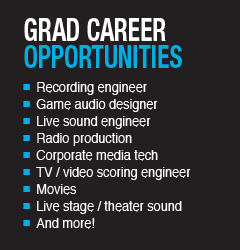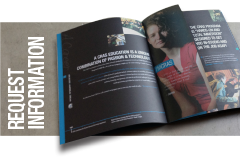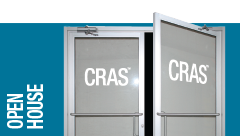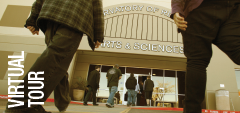Our website has moved, click here to visit our new site at CRAS.edu


ABOUT CRAS






CRAS’s structured programs and highly qualified teaching staff provide students a professional and supportive atmosphere.
First established in New York City, in 1980 a 24-track recording studio called “Songshop” offered adult training classes to novices as well as record label personnel. These classes proved to be very popular and the increasing demand for training and hands-on experience necessitated expansion of the program to include internships with commercial studios and recording artists.In 1987 the entire enterprise moved to Phoenix, AZ and the name was changed to “The Academy of Recording Sciences.” As the reputation of the institution gained prominence in the music recording industry, the name was again changed in 1988 to the Conservatory of Recording Arts & Sciences as this more appropriately reflected the nature of the institution – “to conserve, enhance, improve and promote the artistic and technical skills of audio recording by preparing students to enter the business as qualified audio recording engineers.”
CRAS’s structured programs and highly qualified teaching staff provide a professional and supportive atmosphere, which is complemented by our small class sizes allowing for individual instruction and assistance for students in engineering audio recordings. CRAS has been providing quality vocational training in audio recording for three decades. The curriculum and equipment are constantly being updated to keep pace with the rapid advancements in the music and sound recording industries. CRAS’s course offerings and subject matter have always centered around the skills and knowledge necessary for students’ success in the music industry.
Like Coke for Coca-Cola and Chevy for Chevrolet, The Conservatory of Recording Arts & Sciences has always been called CRAS in “shorthand” by students, faculty, staff and alumni. And, like Coke and Chevy... CRAS has “stuck.” Be CRAS!
Historical Timeline
1980The school’s originator begins offering adult education classes at “Songshop” Studio in New York.
1987
The program is named the “Academy of Recording Sciences” and moves to Phoenix, AZ.
1988
The name is changed to the ”Conservatory of Recording Arts and Sciences,” and the school is licensed by the state of Arizona.
October 1990
CRAS is accredited by the National Association of Trade and Technical Schools - NATTS now known as the Accrediting Commission of Career Schools and Colleges (ACCSC).
May 1992
Community Technical Institutes (CTI) purchases CRAS and the Student Services (Internship) department is established, marking a major turning point.
Fall 1992
Robert Anderson becomes the first CRAS graduate to receive a Gold record (CeCe Peniston’s “Finally” single).
Fall 1993
Dona Roth becomes the first CRAS Graduate to receive a Platinum record (Marc Cohn’s Eponymous album).
February 1994
CRAS is re-accredited with no stipulations by ACCSC.
January 1999
Andrew Garver becomes the first CRAS graduate to be nominated for a Grammy (Rhino Records “Have A Nice Decade” Anthology).
February 1999
CRAS is re-accredited with no stipulations for the second time by ACCSC.
Fall 2002
Ground is broken in Gilbert, Arizona for a new 25,000 square foot facility, topographically recreating the four studios, three labs, and administrative offices of the Tempe location. Additionally, a 6,000 square foot live sound venue is constructed in the Gilbert location.
November 2003
Classes are held for the first time in the satellite facility in Gilbert.
February 2004
Darrel Thorp and Moka Nagatani become the first CRAS Graduates to win Grammys; Thorp for Radiohead’s “Hail To The Thief” (Best Engineered Album-Non Classical) and Outkast’s “Speakerboxxx/The Love below” (Album of the year) and Nagatani for Outkast’s “Speakerboxxx/The Love below” (Album of the year).
July 2004
CRAS is re-accredited with no stipulations for the third time by ACCSC.
June 2005
The Accrediting Commission of Career Schools and Colleges recognized CRAS as a 2005 ACCSC School of Distinction.
October 2005
CRAS becomes charter sponsor of (2005) TEC Hall of Fame Awards at yearly Audio Engineering Society Convention.
October 2006
Audio Kinetic establishes educational partnership with CRAS resulting in the addition of a game audio curriculum using the Wwise audio pipeline solution for game audio.
March 2007
CRAS Receives Game Audio Network Guild Award (G.A.N.G.) award presented at the 2007 Game Developers Conference.
June 2007
CRAS installs the L-Acoustics Kudo Line array, a top sound reinforcement line array in the industry, and offers a student a certificate in the operation and set up of the system.
December 2007
Introduces Laptop Recording Package, to the Master Recording Program II. Every student beginning with the December class will receive a laptop package with their books and supplies.
January 2008
CRAS’s Control room D upgrades to Digidesign’s C|24 Control surface to offer a state-of-the-art production environment.
November 2008
CRAS is re-accredited with no stipulations for the fourth time by ACCSC.
August 2009
The Accrediting Commission of Career Schools and Colleges recognizes CRAS as a 2009 School of Excellence.
Winter 2010
CRAS wins Arizona Private School Association (APSA) Best Practices Award for the implementation of CRAS Connect.
January 2010
28 CRAS graduates work on 56 Grammy nominated recordings.
January 2011
By installing two API Legacy Plus consoles, CRAS continues its prime gear directive to expose students to the best consoles, preamps, speakers and mics.
January 2011
37 CRAS graduates work on 56 Grammy nominated recordings.
January 2012
A record 72 CRAS graduates are nominated for 163 Grammy awards.
March 2012
CRAS upgrades the live sound curriculum with the installation of a Avid VENUE D-Show console, D-Show Sidecar, 48-input VENUE Stage Rack and VENUE Front of House Rack.
August 2013
CRAS partners with Studer to create CRAS/Studer Broadcast Academy.
October 2013
CRAS expands curriculum to include classes in audio for broadcast and live theatre.
CRAS Grad
Career Opportunities
Career Opportunities
Recording engineer
- Music
- Soundtracks
- Music
- Soundtracks
Game audio designer
- Video games
- Apps
- Mobile audio
- Video games
- Apps
- Mobile audio
Live sound engineer
- Concerts
- Stage monitors
- Concerts
- Stage monitors
Radio production
- Location remotes
- Live radio
- Location remotes
- Live radio
Corporate media tech
- Hotels
- Conference centers
- Boardrooms
- Hotels
- Conference centers
- Boardrooms
TV/video scoring engineer
- Background music
- Voice over/narration
- Background music
- Voice over/narration
Movies
- Foley engineer
- Dialog replacement
- Sound effects
- Foley engineer
- Dialog replacement
- Sound effects
Manufacturer’s specialist
- Product rep
- Product specialist
- Product rep
- Product specialist
Environmental sound design
- Malls
- Airports
- Public spaces
- Malls
- Airports
- Public spaces
Live stage/theater sound
- Musicals
- Drama
- Lectures
- Musicals
- Drama
- Lectures
And more!
